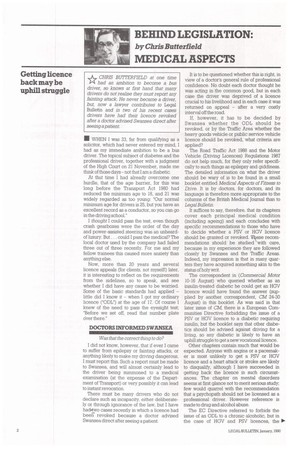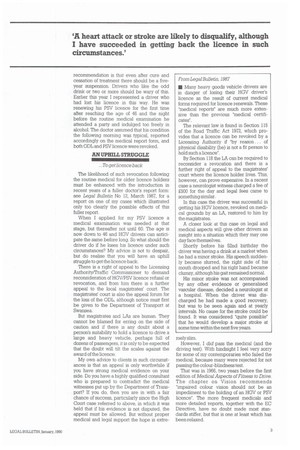BEHIND LEGISLATION:
Page 4

Page 5

If you've noticed an error in this article please click here to report it so we can fix it.
by Chris Butterfield
MEDICAL ASPECTS
Getting licence back may be uphill struggle
CHRIS BUTTERFIELD at one time kA had an ambition to become a bus driver, so knows at first hand that many drivers do not realise they must report any fainting attack He never became a driver, but, now a lawyer contributes to Legal Bulletin and in two of his recent cases drivers have had their licence revoked after a doctor advised Swansea direct after seeing a patient.
III WHEN I was 23, far from qualifying as a solicitor, which had never entered my mind, I had as my immediate ambition to be a bus driver. The topical subject of diabetes arid the professional driver, together with a judginent of the High Court on 21 November, made me think of those daysnot that I am a diabetic.
At that time I had already overcome one hurdle, that of the age barrier, for this was long before the Transport Act 1980 had reduced the minimum age to 18, and 21 was widely regarded as too young; "Our normal minimum age for drivers is 25, but you have an excellent record as a conductor, so you can go in the driving school."
I thought I could pass the test, even though crash gearboxes were the order of the day and power-a.ssisted steering was an unheardof luxury. But. . . could I pass the medical? The local doctor used by the company had failed three out of three recently. For me and my fellow trainees this caused more anxiety than anything else.
Now, more than 20 years and several licence appeals (for clients, not myself!) later, it is interesting to reflect on the requirements from the sidelines, so to speak, and see whether I did have any cause to be worried, Some of the basic standards had applied little did I know it when I got my ordinary licence ("ODL") at the age of 17. Of course I knew of the need to pass the eyesight test; "Before we set off, read that number plate over there."
DOCTORS INFORMED SWANSEA Was that the correct thing to do?
I did not know, however, that if ever I came to suffer from epilepsy or fainting attacks, or anything likely to make my driving dangerous, I must report this. Such a report must be made to Swansea, and will almost certainly lead to the driver being summoned to a medical examination (at the expense of the Department of Transport) or very possibly it can lead to instant revocation.
There must be many drivers who do not declare such an incapacity, either deliberately or through ignorance of the law, but I have hadtwo cases recently in which a licence had been revoked because a doctor advised Swansea direct after seeing a patient. It is to be questioned whether this is right, in view of a doctor's general rule of professional confidence. No doubt each doctor thought he was acting in the common good, but in each case the driver was deprived of a licence crucial to his livelihood and in each case it was returned on appeal after a very costly interval off the road.
If, however, it has to be decided by Swansea whether the ODL should be revoked, or by the Traffic Area whether the heavy goods vehicle or public service vehicle licence should be revoked, what criteria are applied?
The Road Traffic Act 1988 and the Motor Vehicle (Driving Licences) Regulations 1987 do not help much, for they only refer specifically to such things as epilepsy and giddiness. The detailed information on what the driver should be wary of is to be found in a small booklet entitled Medical Aspects of Fitness to Drive. It is by doctors, for doctors, and its language is therefore more appropriate to the columns of the British Medical Journal than to Legal Bulletin.
It suffices to say, therefore, that its chapters cover each principal medical condition (including ageing) and each concludes with specific recommendations to those who have to decide whether a PSV or HGV licence should be granted or revoked. Piese recommendations should be studied 'with care, because in my experience they are followed closely by Swansea and the Traffic Areas. Indeed, my impression is that in many quarters they have acquired something akin to the status of holy writ.
The correspondent in (Commercial Motor 10-16 August) who queried whether as an insulin-treated diabetic he could get an HGV licence would have found the answer (supplied by another correspondent, CM 24-30 August) in this booklet. As was said in that later issue of CM, there is a European Communities Directive forbidding the issue of a PSV or HGV licence to a diabetic requiring insulin, but the booklet says that other diabetics should be advised against driving for a living, so any diabetic is likely to have an uphill struggle to get a new vocational licence.
Other chapters contain much that would be expected. Anyone with angina or a pacemaker is most unlikely to get a PSV or HGV licence and a heart attack or stoke are likely to disqualify, although I have succeeded in getting back the licence in such circumstances. The chapter on mental disorders seems at first glance not to merit serious study; few would quarrel with the recommendation that a psychopath should not be licensed as a professional driver. However reference is made to drug and alcohol abuse.
The EC Directive referred to forbids the issue of an ODL to a chronic alcoholic, but in the case Of HGV and PSV licences, the recommendation is that even after cure and cessation of treatment there should be a fiveyear suspension. Drivers who like the odd drink or two or more should be wary of this. Earlier this year I represented a driver who had lost his licence in this way, He was renewing his PSV licence for the first time after reaching the age of 46 and the night before the routine medical examination he attended a party and indulged too freely in alcohol. The doctor assumed that his condition the following morning was typical, reported accordingly on the medical report form, and both ODL and PSV licence were revoked.
AN UPHILL STRUGGLE H■min■II
To get licence back The likelihood of such revocation following the routine medical for older licence holders must be enhanced with the introduction in recent years of a fuller doctor's report form: see Legal Bulletin No 12, March 1987, for a report on one of my cases which illustrated only too clearly the possible effects of this fuller report.
When I applied for my PSV licence a medical examination was needed at that stage, but thereafter not until 60. The age is now down to 46 and HGV drivers can anticipate the same before long. So what should the driver do if he loses his licence under such circumstances? My advice is not to despair, but do realise that you will have an uphill struggle to get the licence back.
There is a right of appeal to the Licensing Authorityffraffic Commissioner to demand reconsideration of HGV/PSV licence refusal or revocation, and from him there is a further appeal to the local magistrates court. The magistrates' court is also the appeal forum for the loss of the ODL, although notice must first be given to the Department of Transport at Swansea.
But magistrates and LAs are human. They cannot be blamed for erring on the side of caution and if there is any doubt about a person's suitability to hold a licence to drive a large and heavy vehicle, perhaps full of dozens of pAR..sengers, it is only to be expected that the doubt will tilt the scales against the award of the licence.
My own advice to clients in such circumstances is that an appeal is only worthwhile if you have strong medical evidence on your side. Do you have a highly qualified consultant who is prepared to contradict the medical witnesses put up by the Department of Transport? If you do, then you are in with a fair chance of success, particularly since the High Court case referred to above, in which it was held that if his evidence is not disputed, the appeal must be allowed. But without proper medical arid legal support the hope is extre From Legal Bulletin, 1987 • Many heavy goods vehicle drivers are in danger of losing their HGV driver's licence as the result of current medical forms required for licence renewals, These "medical reports" are much more extensive than the previous 'medical certificates".
The relevant law is found in Section 115 of the Road Traffic Act 1972, which provides that a licence can be revoked by a Licensing Authority if "by reason ... of physical disability (he) is not a fit person to hold such a licence", By Section 118 the LA can be required to reconsider a revocation and there is a further right of appeal to the magistrates' court where the licence holder lives. This, however, can prove expensive. In a recent case a neurologist witness charged a fee of £500 for the day and legal fees came to something similar.
In this case the driver was successful in getting his HGV licence, revoked on medical grounds by an LA, restored to him by the magistrates.
A closer look at this case on legal and medical aspects will give other drivers an insight into a situation which they may one day face themselves.
Shortly before his 52nd birthday the driver was having a drink at a market when he had a minor stroke. His speech suddenly became slurred, the right side of his mouth drooped and his right hand became clumsy, although his gait remained normal.
His minor stroke was not accompanied by any other evidence or generalised vascular disease, decided a neurologist at a hospital. When the driver was discharged he had made a good recovery, but was to be seen again and at yearly intervals. No cause for the stroke could be found. It was considered "quite possible" that he would develop a major stroke at some time within the next five years.
mely However, I did pass the medical (and the driving test). With hindsight I feel very sorry for some of my contemporaries who failed the medical, because many were rejected for not passing the colour-blindness test.
That was in 1966, two years before the first edition of Medical Aspects of Fitness to Drive. The chapter on Vision recommends "impaired colour vision should not be an impediment to the holding of an HGV or PSV licence". The more frequent medicals and more detailed reports, together with the EC Directive, have no doubt made most standards stiffer, but that is one at least which has been relaxed.
















































































































